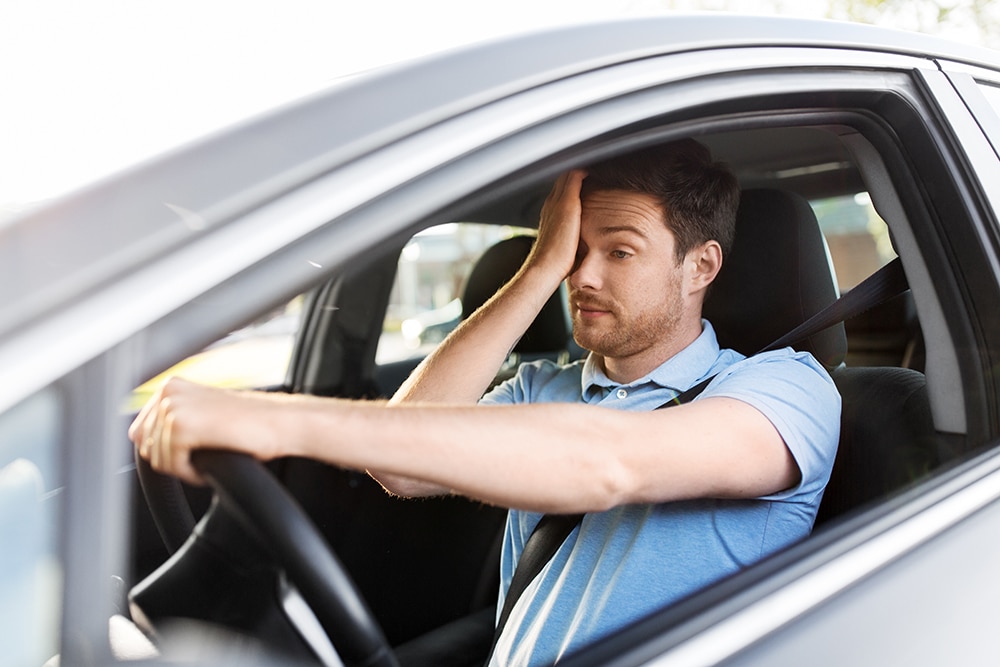How Can I Spot a Sleepy Driver on the Road?

How many times have you felt exhausted after a late night out at a party, concert, sporting event, or after pulling a double shift at work yet drove yourself home? You may have even found yourself in such a predicament because an emergency occurred, or you ventured out to render aid to a friend or family member in need of your help. Some people even stay out longer on the road than they probably should in hopes of reaching a certain landmark on schedule as they drive somewhere.
No matter your reason for being out on the road, most of us probably wouldn’t want to find ourselves out there beyond the point we’re feeling our best. Sadly, some people allow themselves to constantly run on empty and then get behind the wheel of their cars regularly, endangering their lives and everyone else who is in their car or in their path on the road.
Let’s delve a bit more into situations that may bring about drowsiness, explore some tell-tale signs to look for if you’re trying to spot a sleepy driver on the road, and go over the dangers fatigued motorists pose.
What Are Signs of a Sleepy Driver?
Tell-tale signs that a motorist is driving while sleepy is if they:
- Repeatedly yawn
- Become restless
- Drift within one or multiple lanes (or into the shoulder)
- Experience memory lapses
- Become irritable
- Seem to act distant
- Exhibit impatience
- Bob their heads
How Does Drowsiness Progress as Motorists Continue Driving?
If you think back to instances in which you may have driven while fatigued, you might remember that signs that you were exhausted or drowsy became notably worse the more tired you became. Increased drowsiness may have resulted in the following progression of a trucker’s behaviors:
- They might have started yawning or blinking their eyes more rapidly than they traditionally do.
- They may have soon thereafter had difficulty remembering the last few miles that they drove or found themselves shutting their eyes for a more prolonged period of time.
- They may have even had difficulty staying in their lane. They may have been alerted to that fact by another motorist honking their horn or when they heard the rumble strips along the shoulder.
There’s also the possibility that it took a police officer pulling them over or an accident to know that their drowsiness had gotten the best of them.
What Dangers Do Sleepy Motorists Pose?
Research published by the Centers for Disease Control and Prevention (CDC) captures how driver exhaustion impacts a motorist’s operation of their vehicle, not all that differently from the way that alcohol does. Drivers tend to experience the following ill-effects the longer they stay on the road when tired:
- Increased reaction times (when responding to potential hazards that enter their path)
- Decreased decision-making abilities
- An increased likelihood of altogether falling asleep (as opposed to periodically dozing off for a matter of seconds)
CDC research shows that motorists who go for anywhere between 18 and 24 hours without receiving proper rest are most likely to experience diminished driving capabilities akin to someone who is legally intoxicated.
Why Do Motorists Drive When Tired?
We’ve already covered some of the more common reasons why drivers may find themselves operating their vehicle beyond a stage of prime alertness. Those reasons included:
- Overworking or getting off late
- Returning home late after having attended an event
- Overextending oneself when traveling to reach a certain landmark
- Being awakened or otherwise tapped to help a friend in an emergency situation
However, some additional factors that may contribute to driver fatigue that we haven’t yet mentioned include:
- Alcohol or drug intoxication
- Finding oneself delayed by weather or car trouble
- Because truckers’ employers put pressure on them to meet unrealistic demands and violate federal hours of service regulations
- Taking certain medications (both prescription and over-the-counter)
In terms of the latter, it’s not uncommon for drug manufacturers to place warning labels on over-the-counter medications like antihistamines and sleep aids, warning of their drowsiness-inducing properties.
Doctors, prescription drug manufacturers, and pharmacists may also warn you of the dangers of operating machinery (including cars) after taking the prescribed medication. Those same warnings may also describe how combining the medication with alcohol consumption may increase feelings of fatigue.
Some classes of prescription medications that may be sleep-inducing include:
- Antidepressants
- Muscle relaxers
- Blood pressure medications like beta-blockers
- Narcotic pain relievers
- Allergy medications like antihistamines
- Anxiety medications like benzodiazepines
- Anticonvulsants (which are used to treat epilepsy or seizures)
Of course, prescription sleep aids can cause drowsiness. Some medications used to treat gut issues or cancer can also have a sleep-inducing effect.
Most any truck accident lawyer who regularly handles personal injury cases has seen their fair share of injury-involved drowsy driving collisions. Truckers may have taken their chances and taken certain drugs before getting behind the wheel of their trucks in Illinois without first apprising themselves of the warnings associated with doing so.
What Types of Accidents Do Drowsy Motorists Cause?
Drowsy driving-related accidents in Ottawa, IL aren’t all that different from drunk driving-related ones in terms of their intensity. Sleepy truckers or motorists in general often:
- Cross center lines into oncoming traffic, causing head-on crashes
- Travel into shoulders, which causes them to strike stationary objects on the side of the road or to have a rollover accident
- Sideswipe other vehicles, wildlife, cyclists, or pedestrians as they weave within or outside their lane
- Cause rear-end crashes after failing to notice a motorist ahead who applies their brakes
- Become entangled in wrong-way accidents when they take the wrong turns
The listing above is far from exhaustive. The possibilities are endless in terms of the life-threatening accidents that drowsy motorists cause.
Injuries That Result from Drowsy Driving Accidents
While countless fatigued truckers ultimately make their way home or to their next stop without being pulled over by law enforcement, suffering injuries, or hurting anyone else, many others aren’t as fortunate.
The types of injuries that individuals may suffer as a result of their involvement in a drowsy driving accident may include:
- Blunt force trauma to the head or internal organs
- Compression injuries or compartment syndrome (both of which may warrant an amputation)
- Neck or spinal cord injuries, potentially resulting in partial or complete paralysis
- Fractured bones
Individuals who are involved in a collision with a sleepy truckers can often lose their lives.
How Attorneys Help Following Drowsy Driving Accidents
Anyone who has suffered severe injuries that an Ottawa collision with a sleepy trucker can cause knows how critical those first few days, weeks, and months are to shaping their future prognosis.
Your goal needs to be to keep your stress levels low and do everything your doctor recommends to ensure you have the best outlook possible. You should leave dealing with insurance adjusters to a truck accident lawyer who is well-prepared to take an aggressive stance when they inevitably try to deny liability or try to minimize your injuries.
The attorneys at Schweickert Ganassin Krzak Rundio, LLP are standing by and are ready to learn more about your accident so they can get to work on securing the compensation you deserve. Fill in our brief contact form below to get in touch with us.








